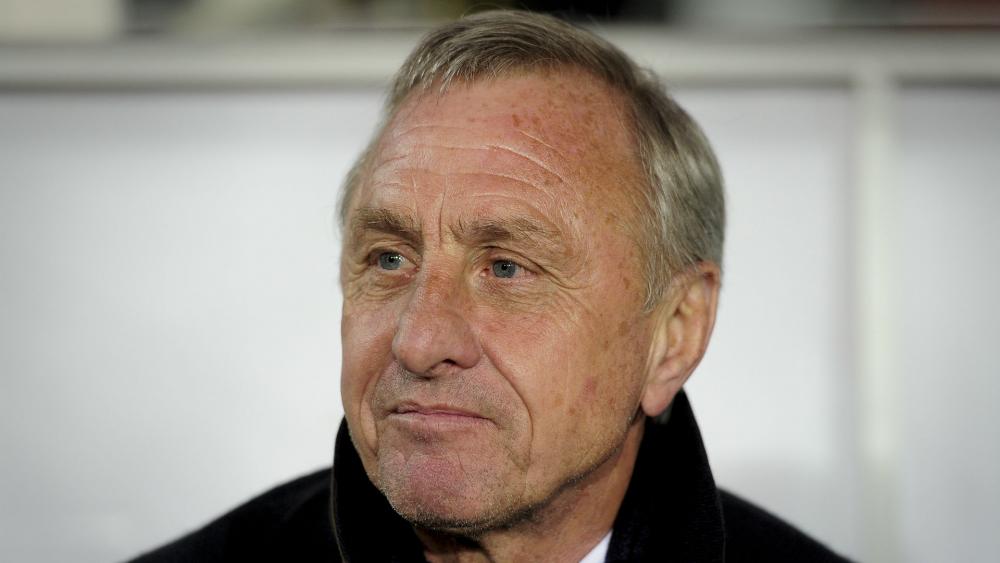'The best footballer Europe has produced' - Johan Cruyff: 1947-2016
We take a look back at the life of Johan Cruyff, who has passed away after losing his battle against cancer.

"He was certainly the best footballer Europe has produced." The words of Germany great Franz Beckenbauer serve as a fitting tribute to the influence and impact of Johan Cruyff, who passed away on Thursday.
Cruyff died aged 68 in Barcelona and will forever be remembered as one of the greatest footballers of all time, someone who revolutionised the game with his 'total football' philosophy.
The forward enjoyed his biggest successes at club level with Ajax, the club where he made his first-team debut at the tender age of 17. Despite Ajax’s 3-1 defeat at the hands of GVAV, Cruyff immediately made a name for himself as he scored his side's only goal. That game was the start of something special.
Cruyff would go on to lead Ajax to six Eredivisie titles in the 1960s and early 1970s, while also winning four KNVB Bekers during his first spell with the Amsterdam giants, scoring an incredible 247 goals in 318 appearances.
It was in Europe that he really made an impact on the game, though.
After losing the European Cup final in 1968-69, Ajax would become the team to beat in the years to come with their free-flowing attacking football. The Amsterdam side saw off Panathinaikos in the final in 1970-71, beat Inter the following year and defeated Juventus in 1973 – and Cruyff was at the very heart of their success. Not only did he score both of Ajax's goals in the 2-0 win over Inter, but he was very much the man who was calling the shots, both on and off the pitch.
The gifted attacker left Ajax for Barcelona in controversial fashion in 1973 after he was stripped of the captaincy, with his former coach Rinus Michels immediately jumping on the opportunity to lure the iconic number 14 to Camp Nou. Cruyff did not waste any time in making an impact at the Catalan club, helping them to their first La Liga title in 14 years in his maiden season at the club and becoming an instant legend.
Get FourFourTwo Newsletter
The best features, fun and footballing quizzes, straight to your inbox every week.
It was then at the 1974 World Cup that Cruyff confirmed his status as one of the best players the game had ever seen.
The Dutch had not appeared at a World Cup since 1938 and had failed to make much of an impact in the years preceding the tournament in West Germany, but Cruyff took his team by the hand. He inspired Oranje to wins over Uruguay, Bulgaria, Argentina, East Germany and Brazil on their way to the final, before they were finally halted by West Germany, introducing the famous 'Cruyff-turn' in the process.
Irrespective of Netherlands' defeat in the final, their 'total football' was the new benchmark in football and Cruyff was its main representative.
The 1974 World Cup would prove to be the highlight of Cruyff's career with the national team as he missed out on the 1978 World Cup, where the Dutch again stumbled at the final hurdle in Argentina.
Cruyff made the most of his meagre 48 caps for Oranje, scoring 33 goals in a superb international career.
After leaving Barcelona in 1978, he enjoyed spells with LA Aztecs, Washington Diplomats and Levante before re-joining Ajax and then moving on to Feyenoord, with Cruyff hanging up his boots in 1984.
But Cruyff’s legacy did not end there. Already someone who was very much in charge on the pitch during his active career, he was destined to become a coach.
He started out on the bench at Ajax, only to join his beloved Barcelona in 1988, where he would be in charge for eight seasons. It was under Cruyff that they won their first European Cup, with Ronald Koeman firing 'the dream team' to victory over Sampdoria, while he also led the Catalans to four Liga titles.
And even after Cruyff’s departure in 1996, his spirit very much lived on at Camp Nou.
It was the Dutchman who was the driving force behind their much-heralded academy, with La Masia producing players such as Carles Puyol, Xavi, Andres Iniesta and Lionel Messi over the years.
Pep Guardiola's side that conquered Europe between 2008 and 2012 with their famous tiki-taka style was very much inspired by Cruyff’s philosophy, as was the Spain team that won back-to-back European Championships and the World Cup.
"Cruyff painted the chapel and Barcelona coaches since merely restore or improve it," Guardiola once said about his former mentor.
His first love Ajax also turned to Cruyff back in 2011 in their attempts to become a force to be reckoned with, the club legend advising a major overhaul of their renowned youth academy as a number of former players returned to Amsterdam as part of his 'velvet revolution'.
With Cruyff’s tragic death, the footballing world has lost one of its eternal greats. But his philosophy and ideas will live on forever.
